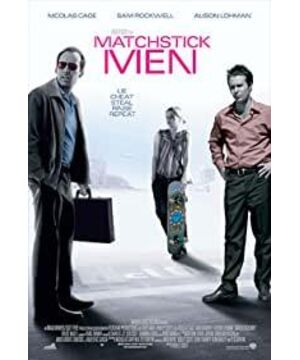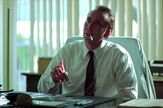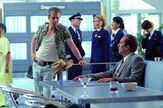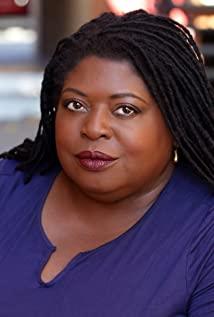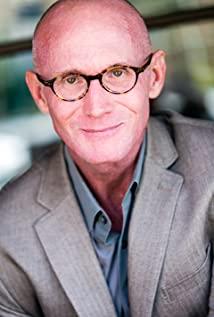film "Stickman" tells the story of a swindler with obsessive-compulsive disorder who returns to a normal life after experiencing a "family scam". "Matchstick Men" - American slang for fraudsters who are highly deceived and conscientiously weave lies so that others are willing to be deceived. Even if they only have a box of matches in their hands, they have a way to use high-level deception to exaggerate the effectiveness of the matches, and get a bunch of people holding cash and rushing to buy matches from them. Nicolas Cage played Roy in the film is such a "stickman".
Roy and his partner Frank have worked together for many years, relying on their superb deception skills, and they have succeeded repeatedly. For Roy, however, his personal life was a mess. He and his wife have been divorced for 15 years, and he is accompanied by a sculptural dog stuffed with banknotes all day. In addition, Roy also suffers from severe obsessive-compulsive disorder. In order to analyze Roy's obsessive-compulsive disorder, I first explain the definition of obsessive-compulsive disorder. Obsessive-compulsive disorder refers to a neuroticism dominated by obsessive-compulsive symptoms, which is characterized by the coexistence of conscious self-compulsion and anti-compulsion. The strong conflict between the two makes the patient feel anxious and distressed; the patient experiences that the concept or impulse comes from the self, but violates the self. Willingness, even though it is strongly resisted, cannot be controlled; patients are also aware of the abnormality of obsessive-compulsive symptoms, but they cannot get rid of them; those who migrate in the course of the disease should focus on ritual movements to relieve mental pain, but their social functions are severely damaged.
In addition to meeting the diagnostic criteria for neuroticism, the diagnostic criteria for obsessive-compulsive disorder also include obsessive thoughts and obsessive behaviors. Roy in the film reflects on both obsessive thoughts and obsessive behaviors.
First, obsessive thoughts: First, Roy's main activity space is indoors, because he is not used to going out, and once he goes out, he is afraid of losing his self-control. In the film, once Roy has to go out, he is worried that the ground will not stop twitching. When his unexpected daughter asks him to hang out with her, Roy angrily refuses, "You know, your dad isn't for the outdoors."
Second, Roy always felt that the surrounding environment was dirty, and he always had the idea that he couldn't help but want to clean it. Roy told his family doctor after an exhausting housecleaning: "Look, doctor, last Tuesday I spent the whole day in hiding and cleaning the carpet. Whenever I stared at the carpet, I was always worried that I would Vomiting. I'm thinking, I'm an adult, I should be able to know what's going on in my head. The more I think about it, the more I feel like I should kill myself. But the thought of killing myself makes me worry about my damn The carpet was a mess. So, it was a good day, doctor." From Roy's remarks, we can appreciate the pain that obsessions bring to obsessive-compulsive patients. People with OCD know that obsessive-compulsive symptoms originate within themselves and are not imposed by others or outside influences. Patients feel that their obsessions are meaningless, feel unpleasant and distressed, and try to resist, but it doesn't work.
Third, Roy is always worried about whether the door in the house is closed properly.
Fourth, Roy always felt very uncomfortable whenever he heard his numbers, and couldn't help but keep counting down. There are several scenes in the film where Roy goes shopping in the supermarket. During the checkout, the American salesperson really had poor arithmetic skills as in the legend. Every time, he exchanged Roy's one hundred dollars for one hundred pieces of one-dollar change, and then counted out the money Roy bought one by one. Count, and then report the number orally and count the amount of money, while handing the change to the customer. For Roy, the salesperson's sound of counting money was an obsessive-compulsive disorder. Every time he checked out, Roy tried to restrain himself and escape as quickly as possible.
Secondly, in terms of compulsive behavior, Roy has the following symptoms. First, the door must be closed three times, and while saying "one, two, three" in the mouth. This is a common symptom of people with OCD. The patient feels that the purpose of this is to respond to those obsessions in order to avoid or reduce anxiety and avoid the feared event or situation. In the film, Roy does this because he is always worried about whether the door is closed properly. To comfort himself, he will keep closing the door repeatedly, and believes that only after repeating a few times can he be sure that the door is really closed. Over time, this repetitive door-closing action evolved into Roy's daily ritual habit.
Second, wash your hands too often. Roy in the film has a cleanliness addiction, he is frantically seeking cleanliness and cannot tolerate any swag. He must wear gloves for housework; borrow tools when putting on shoes and never touch shoes with his hands. Frequent hand washing is another common symptom of obsessive-compulsive disorder patients. As long as the hands come into contact with other things, the patients will think that there are dirty things on their hands, so they will wash their hands frantically.
Third, the items are placed regularly, and everything has a fixed position. In the film, Roy's house is neat and tidy, and everything has a fixed position, and there can be no flaws. The things in his house have to be placed many times before they can stop. For this reason, he repeatedly placed and organized the room until he was exhausted. This reflects an overly perfectionist aspect of Roy's personality. A popular view is that although most people with OCD do not have a history of obsessive-compulsive personality, individuals with obsessive-compulsive personality are at risk of developing OCD. In the film, Roy is not proud of his behavior of repeatedly placing furniture, but feels disgust and pain, and wants to give up these things, but there is no way. It can be seen that Roy is not an individual with obsessive-compulsive personality, but an obsessive-compulsive disorder patient.
There are three main different theoretical perspectives on how individuals develop OCD: psychodynamics, cognitive behavioral theory, and neuroscience. There are three different ideas about how obsessive-compulsive disorder is maintained: the psychodynamic view that obsessions and accompanying impulses are maintained because they successfully resist anxiety; the cognitive-behavioral theory view that patients find that ritual behavior can temporarily Relieves anxiety, which is reinforced by repeated repetitions; neuroscientific view is that obsessive thoughts and behaviors are directed towards objects and situations that are seen as threatening. Combining the above three points of view, I will explain the reasons why Roy's obsessive-compulsive disorder is maintained based on the film.
First, both psychodynamic and cognitive-behavioral theories suggest that obsessions and compulsions are maintained because they help patients temporarily resist anxiety. Many details in the film show Roy's anxiety and inner restlessness. As a fraudster whose conscience has not been wiped out, Roy often feels a strong sense of guilt and insecurity. He was worried that the deceived people would come back to seek revenge for him. Sometimes, after deceiving people, he would feel uneasy in his conscience, but he could not resist his desire for money inflation. How to be liberated? How can I make myself feel safe? By sticking to peeling pink pills every day? By that pistol that can go off at any time hidden in the mouth of the sculpture dog? Unlimited desire to pile up and gradually crowd by being locked in a safe? Relying on deceitful tricks that you can't stop even though you have to do it? The accumulation of material wealth did not make Roy feel safe. He was still anxious and kept telling his daughter, whom he hadn't seen for many years, "Your father is not a good person." In order to relieve his anxiety and anxiety, Roy could only rely on repeated back and forth three times. closed the door; he could only keep kneeling in the small and closed rental room and wipe the furniture under the surprised eyes of his roommate; because he was worried about going out, his vision was tilted, subverted, blurred, and distorted.
Second, the neuroscientific view holds that obsessive thoughts and behaviors refer to things and situations that are perceived as threatening. This is also fully reflected in the film. Roy had to close the door three times every time, and counted one, two, three. Doors are a threat to Roy. As a fraudster, Roy has to constantly worry about whether someone who has been deceived will break in and break into his house to seek revenge on him. The door, as a barrier to isolate the home from the external environment, is very important whether it is firm or not. That's why Roy developed repetitive door-closing movements, the purpose of which is to soothe his anxiety and restlessness. The same is true of being afraid to go out. All of Roy's scams need to be done away from home. And all danger happens outdoors. Therefore, the outdoors is a threatening situation for Roy. Roy's facial muscles twitched with tension whenever he had to go out. In addition, from a psychodynamic point of view, Roy's repetitive handwashing behavior can be explained. The psychodynamic view holds that individuals with certain unconscious conflicts develop obsessive-compulsive disorder. In the film, although Roy is a fraudster, his conscience is not destroyed, which can be seen from the "family trap" that he fell into the fake daughter later. For his career, Roy constantly blamed himself. He kept saying to his daughter, "You know, Dad is not a good person." From Roy's self-blaming remarks and behavior, it can be seen that he may have a hope that he is a good person at an unconscious level. In reality, he is a fraudster. This conflict is reflected in his life that he always feels dirty, so he keeps washing his hands in hopes of washing away his guilt.
At the end of the movie, Roy was deceived by his partner Frank's trap of all his savings, and his trumped-up daughter also disappeared as part of the trap. And Roy finally washed his hands after the pain, and chose not to take revenge, living with a happy cashier and starting a family. And his obsessive-compulsive disorder miraculously healed after losing everything. In real life, people's prognosis for obsessive-compulsive disorder was not optimistic until the 1990s. But now, both behavioral therapy and medication can be used to treat OCD. Behavioral therapy techniques for OCD are primarily a combination of three basic techniques: response prevention, exposure, and imitation. The most obvious effect of drug therapy is to prevent the reabsorption of serotonin, which benefits the patient. In the movie, Roy's obsessive-compulsive disorder is improved mainly due to his "fake daughter" and his "golden pot". Before, Roy didn't know that Anglia, who suddenly appeared and claimed to be his daughter, was actually a liar. The motivation of family love made him tolerate all Anglia's behavior. He allowed Anglia to mess up the neatly tidy room, allowed Anglia to step on the floor of the house with her shoes on, and even reluctant to wipe the phone number Anglia wrote on his hand. In a way, tolerating Anglia's behavior was a form of exposure therapy that played a role in Roy's recovery. After Roy decided to quit the arena and start a new family, his heart knot was finally unraveled, and the conflict at the unconscious level was also eliminated with his retirement. Roy finally returned to a normal life.
View more about Matchstick Men reviews


